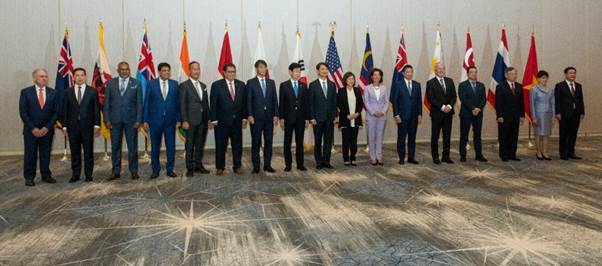Description

Copyright infringement not intended
Context: India stayed out of the joint declaration on the trade pillar of the U.S.-led Indo-Pacific Economic Framework ministerial meet in Los Angeles, with Union Commerce Minister Piyush Goyal citing concerns over possible discrimination against developing economies.
Details:
- India was the only one of the 14 IPEF countries, which include South East Asian countries, Australia, New Zealand, South Korea and Japan, not to join the declaration on trade.
- Union Minister of Commerce and Industry said that fruitful discussions had been held over the course of the Indo-Pacific Economic Framework (IPEF) Ministerial meeting to bring together a group of likeminded, rules-based, transparent countries with a shared interest in an open Indo-Pacific region.
- Highlighting that India had engaged very exhaustively in all the various streams of discussion, Shri Goyal said that on three out of four pillars related to supply chains, tax and anti-corruption and clean energy, India was comfortable with the outcome and text and have joined the declaration.
- On one pillar, which deals primarily with trade, the Minister said, the contours of the framework - particularly on commitments required on environment, labour, digital trade and public procurement — are still emerging.
- We have to see what benefits member countries will derive and whether any conditionalities on aspects like environment may discriminate against developing countries who have the imperative to provide low cost and affordable energy to meet the needs of our growing economy, the Minister said.
- Indo-Pacific Economic Framework for Prosperity (IPEF) is an economic initiative launched by United States President Joe Biden on May 23, 2022.
- IPEF has fourteen member states: Australia, Brunei, Fiji, India, Indonesia, Japan, South Korea, Malaysia, New Zealand, Philippines, Singapore, Thailand, United States and Vietnam.
- The four themes of the proposed IPEF are:
- Fair and resilient trade
- Supply chain resilience
- Infrastructure, clean energy, and decarbonization
- Tax and anti-corruption

Analysis:
- India’s decision to stay away from the trade pillar of the United States-led Indo-Pacific Economic Framework (IPEF) ties in with an evolving consensus in New Delhi’s approach to global partnerships.
- This new consensus has some deepening gridlines: staying off multilateral trade pacts, sticking to bilateral deals that progressively build on an early harvest scheme; actively integrating into specialised global supply chain arrangements such as for rare earths or pharmaceutical ingredients; and restricting multilateral exposure to focused agreements such as tackling black money or cryptocurrency rules.
- The backtracking on multilateral engagement on commerce comes at a time when trade statistics are beginning to turn inclement after a short, buoyant phase: the adverse contribution of net exports to real GDP growth — at minus 6.2% in April-June 2022-23 — was a record of sorts (the highest for the current GDP base series 2011-12), even as the country’s trade deficit narrowed slightly to $28.7 billion in August from a record high of $30 billion in the previous month.
- While the global slowdown is a key contributing factor, there are specific concerns too: India seems to be impacted more than others as the trade pie shrinks. For instance, in the key US market for textiles and garments, India’s growth in the first six months of 2022, while nearly 30 per cent, is the slowest among the top five exporters excluding China.
- Other key suppliers – Vietnam, Bangladesh, Indonesia – are all doing way better, with India marginally trailing the average growth that all suppliers of textiles and garments into the US clocked over this period (see table).
- The IPEF is not exactly a trade pact and the provision of multiple pillars does entail an option to participants to choose what they want to be a part of. It’s not a take-it-or-leave-it arrangement, like most multilateral trade deals are.
- Also, the IPEF envisages some degree of synergies with Quad members’ strategic priorities. “
- The onboarding of India’s concerns and flexibility on the IPEF comes after New Delhi, on the eve of the conclusion of the pan-Asian RCEP (Regional Comprehensive Economic Partnership), announced India’s withdrawal from the agreement, amid concerns of a surge in imports from China.
- The IPEF engagement also comes at a time when India is attempting to find a place in the Minerals Security Partnership (MSP), an ambitious new US-led 11-member partnership to secure supply chains of critical minerals, aimed at reducing dependency on China.
- On the other hand, New Delhi’s outlook on bilateral negotiations appears to be remarkably upbeat: a free trade agreement (FTA) with the United Kingdom is expected to be concluded over “the next few weeks”, while talks with Canada are progressing well, according to government officials.
- This comes on the back of two trade agreements – one with the UAE and an early harvest deal with Australia – that have been signed over the last 12 months.
- India “is hopeful of concluding the negotiations for two more such pacts” by the end of this year.
https://www.pib.gov.in/PressReleasePage.aspx?PRID=1858243














